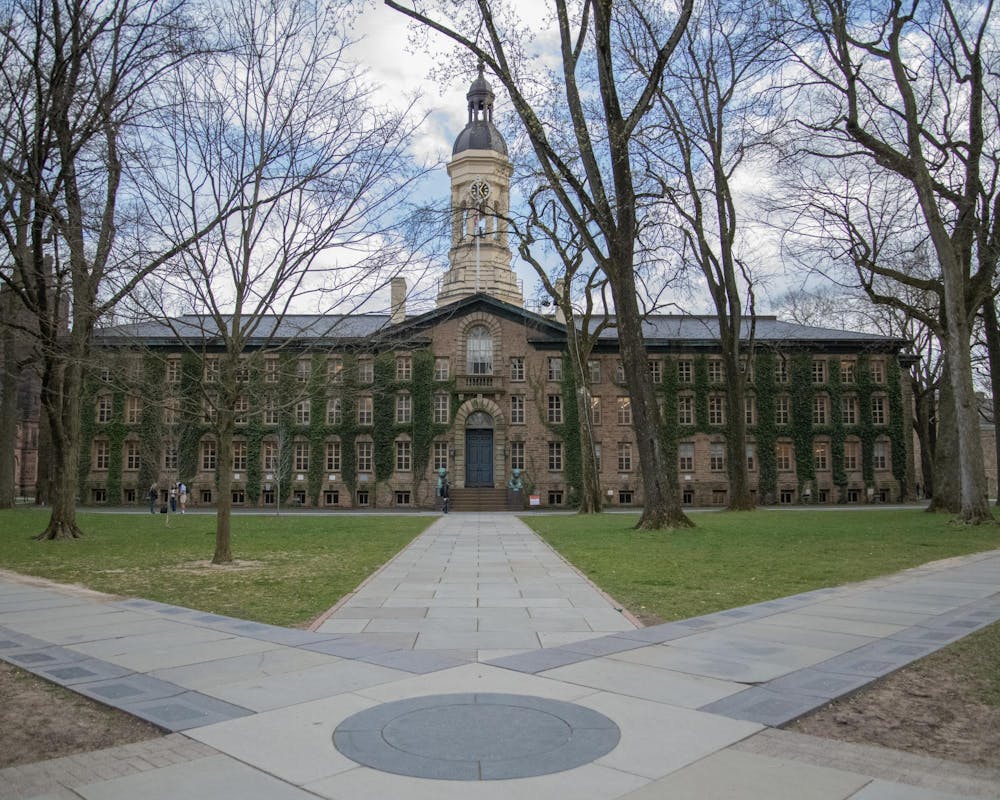Faculty members narrowly passed a non-binding resolution condemning the University’s handling of disciplinary action against pro-Palestine protestors, calling for both legal and disciplinary amnesty for arrested students. The vote, held on Monday afternoon in Richardson Auditorium, passed 154–136, with eight abstentions. There are approximately 1,000 faculty members eligible to vote, including tenured and tenure-track professors as well as full-time lecturers.
“It shows the university that there's a real hunger among the faculty for having a more democratic input into how decisions are made, and a dissatisfaction when decisions are made that are opaque and don't follow what seems to be a proper procedure — and worst of all does so at the expense of the students that we care so much about,” said Curtis Deutsch, Professor of Geosciences and the High Meadows Environmental Institute.
Deutsch was one of six faculty members — alongside Molly Greene GS ’93, Ruha Benjamin, Dan-El Padilla Peralta ’06, Lidal Dror, and V. Mitch McEwen — who initially petitioned for a special meeting to be held regarding divestment from Israel and free speech. The eventual agenda at Monday’s meeting only considered a resolution on student discipline.
The faculty vote comes after the conclusion of the disciplinary process against arrested students, University spokesperson Jennifer Morrill wrote to The Daily Princetonian in a statement. Based on precedent in similar cases, Morrill wrote, “it is unlikely that the cases will result in penalties greater than probation,” meaning that it is likely graduating students will receive their degrees and walk at graduation. Four of the students arrested at Clio Hall on April 29 are members of the Class of 2024.
Morrill did not specify how long possible probations might last and if the University would continue to pursue legal charges, but wrote that the University “continues to explore with the appropriate law enforcement officials how the University might help minimize the impact of the arrests.”
However, it appears that the University has already rolled back punitive measures against some of the arrested students. According to a statement by Princeton Israeli Apartheid Divest (PIAD) on May 18, Achinthya Sivalingam GS and Hassan Sayed GS, the two graduate students arrested on the first day of the encampment, are no longer barred from campus.
The narrow margin by which the faculty vote passed reflects divisions in views on the role of faculty in the disciplinary process. Jonathan Mummolo, associate professor of Politics and Public Affairs, opposed settling disciplinary matters through a faculty vote in an op-ed in the ‘Prince’ written last week.
“Ruling on amnesty for protesters by way of an ill-informed faculty vote is not wise, or just. The way to adjudicate conflicting accounts of recent events and arrive at a fair resolution is through a careful investigative process, which is precisely what our established disciplinary procedures provide,” he wrote.

Special faculty meetings are exceedingly rare in Princeton’s history, and Monday’s vote marks the first time in decades that faculty have formally voted to condemn the University’s handling of student protesters. In 1972, the Faculty Council on Vietnam voted not to press charges against 58 students who had conducted a sit-in in Nassau Hall and blocked a trustee meeting.
In a statement to the ‘Prince,’ University President Christopher Eisgruber expressed his satisfaction with the vote.
“I'm grateful to members of the faculty present at the meeting for having a civil discussion about a difficult set of issues,” he wrote. “I appreciate the care they feel for our students as well as their concerns around both violations of the University policy and the need for integrity of University procedures.”
The vote and discussion around the measure was closed to public observers.

Monday’s vote comes the same day that faculty at Harvard overwhelmingly voted to graduate the 13 students initially barred from commencement due to their involvement in Harvard’s pro-Palestine encampment.
Still, some see that there is more action to be done. “Everything else that we originally set out to do here is for another day, but for now, I hope that the administration is on notice that we want a say,” Deutsch said.
Miriam Waldvogel is an associate News editor and the investigations editor for the ‘Prince.’ She is from Stockton, Calif. and often covers campus activism and University accountability.
Christopher Bao is an assistant News editor and the accessibility director for the ‘Prince.’ He is from Princeton, N.J. and typically covers town politics and life.
Please send any corrections to corrections[at]dailyprincetonian.com.








